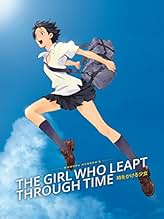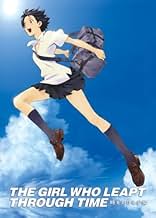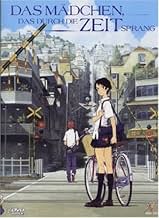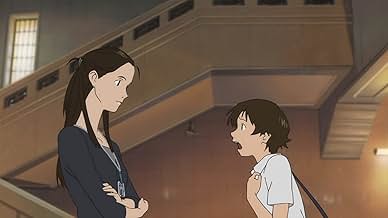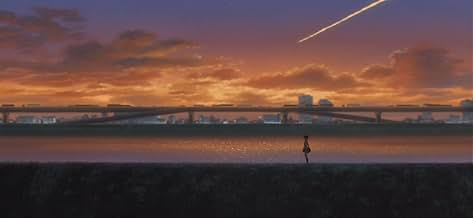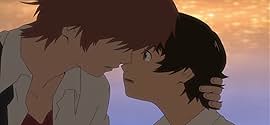AVALIAÇÃO DA IMDb
7,6/10
74 mil
SUA AVALIAÇÃO
Uma garota do ensino médio chamada Makoto adquire o poder de viajar no tempo e decide usá-lo para seus próprios benefícios pessoais.Uma garota do ensino médio chamada Makoto adquire o poder de viajar no tempo e decide usá-lo para seus próprios benefícios pessoais.Uma garota do ensino médio chamada Makoto adquire o poder de viajar no tempo e decide usá-lo para seus próprios benefícios pessoais.
- Direção
- Roteiristas
- Artistas
- Prêmios
- 12 vitórias e 2 indicações no total
Riisa Naka
- Makoto Konno
- (narração)
Takuya Ishida
- Chiaki Mamiya
- (narração)
Mitsutaka Itakura
- Kosuke Tsuda
- (narração)
Ayami Kakiuchi
- Yuri Hayakawa
- (narração)
Mitsuki Tanimura
- Kaho Fujitani
- (narração)
Yuki Sekido
- Miyuki Konno
- (narração)
Utawaka Katsura
- Makoto's Father
- (narração)
Midori Ando
- Makoto's Mother
- (narração)
Fumihiko Tachiki
- Fukushima-sensei
- (narração)
Keiko Yamamoto
- Obasan
- (narração)
Shiori Yokohari
- Moriko Uesugi
- (narração)
Sonoka Matsuoka
- Sekimi Nowake
- (narração)
Takayuki Handa
- Kato
- (narração)
Maho Kurashima
- Female Newscaster A
- (narração)
Taeko Hase
- Additional Voices
- (narração)
Keiko Aizawa
- School Nurse
- (narração)
- …
Kiyomi Tanigawa
- Home Economics Teacher
- (narração)
- …
Atsuko Yuya
- Additional Voices
- (narração)
- Direção
- Roteiristas
- Elenco e equipe completos
- Produção, bilheteria e muito mais no IMDbPro
Avaliações em destaque
Alert: This movie has the most fantastic background graphics, equal in quality to the very best--like cowboy bebop or something from studio ghibli (spirited away). just wonderful color of the sunsets, schools houses etc.
As a teen slice of life/tentative romance/drama the story seems like it could be cliché, but they do interesting things with it, make it more dramatic in the middle, and at the end i was satisfied. the emotional depth sort of sneaks up on you.
Sounds were well-integrated into the film and the voice actors were spot-on in their portrayals.
just a fine experience watching this on here in Asia.
Highly recommended for all, but a must for anyone who's into anime.
wow I'm gonna look out for anything by this studio and director in the future.
As a teen slice of life/tentative romance/drama the story seems like it could be cliché, but they do interesting things with it, make it more dramatic in the middle, and at the end i was satisfied. the emotional depth sort of sneaks up on you.
Sounds were well-integrated into the film and the voice actors were spot-on in their portrayals.
just a fine experience watching this on here in Asia.
Highly recommended for all, but a must for anyone who's into anime.
wow I'm gonna look out for anything by this studio and director in the future.
This terrific fantasy focuses on a girl who discovers she can jump back in time, and much of the movie is a light-hearted exploration of what a teenage girl would do with that power, which is essentially relive life better, avoid uncomfortable conversations, and eat pudding. The lead character is likably average.
There are a few oddities in this movie. Some of them are because it turns out, as I learned at wikipedia, that this isn't actually the same story as the novel upon which it is based but a sequel containing a character from the original movie, which explains a lot. Apparently the original story has been made into several movies and TV series in Japan, so the assumption was probably that everyone would understand a lot of references I didn't get.
Also, towards the end, we are given little pieces of information that suggest there is a whole other story to learn, although whether that story is in the original book or whether that would be the subject of yet another narrative I don't know.
Then there's the ending, which is logically unsatisfying and yet which I ultimately found emotionally resonant. It's one of these puzzling endings that has you reading wikipedia and going through the IMDb forum posts (which offer a lot of fascinating theories).
Well worth watching.
There are a few oddities in this movie. Some of them are because it turns out, as I learned at wikipedia, that this isn't actually the same story as the novel upon which it is based but a sequel containing a character from the original movie, which explains a lot. Apparently the original story has been made into several movies and TV series in Japan, so the assumption was probably that everyone would understand a lot of references I didn't get.
Also, towards the end, we are given little pieces of information that suggest there is a whole other story to learn, although whether that story is in the original book or whether that would be the subject of yet another narrative I don't know.
Then there's the ending, which is logically unsatisfying and yet which I ultimately found emotionally resonant. It's one of these puzzling endings that has you reading wikipedia and going through the IMDb forum posts (which offer a lot of fascinating theories).
Well worth watching.
10ethSin
There are about 10 Japanese films that I re-watch almost every year since their releases. "The Girl Who Leapt Through Time" is one of only three such animated films for me.
"The Girl Who Leapt Through Time" is based on a 1967 hit novel of the same title. The original work has been used in numerous film and dorama adaptations, most famous ones being the 1983 film directed by Oobayashi Nobuhiko. Instead of making just another anime adaptation and possibly becoming just another adaptation shadowed by the 1983 film, the producers took a risk by creating a spin-off movie with the setting of about 20 years after the original story. The gamble paid off big time, as the animated film went on to win at least 23 awards worldwide.
The underlying theme in this movie was "the importance of living the moment". Our protagonist was given the power to leap back into time to correct her mistakes, only to realize later that the short-term gains only lead to greater losses that followed. The story was extremely well-constructed to teach the lesson of embracing things the way they are, and never run from confrontations, because once that moment gone, you'll never get it back.
The director for this film did a phenomenal job of pacing and creating many memorable moments, but it was the live-action film screenwriter Okudera Satoko, who really made a difference for this movie by composing a story out of number of time leaps that slowly developed the main characters and made so many epic scenes possible. Many anime screenwriters fail in movies because they incorporate too many characters, as it is common practice in series, into the limited 100 minute time-frame. What's remarkable about this piece of work is that it focuses on only three main characters. Even counting the secondary cast, there are only 8 characters in total who we are given the names of. The limited number of characters not only improved character development, it also allowed the story to focus on the underlying theme.
I was actually very uncertain about the viewing this year because I started watching a lot of TV anime again since the last viewing. However, the only new flaws I've noticed was the excessive still motion in some scenes and most backgrounds, and that the protagonist was being a bit overly insensitive in few instances, which made her character a bit unrealistic. Animation is years ahead of its time, and it still is an excellent example of what happens when music is in harmony with the story/animation. The insert song by Oku Hanako, IMO, is still the best selection ever made among hundreds of Japanese films, anime, and live-action doramas I've encountered. Ending theme is a truly poignant one that really captured the mood and made the story sink in, and the music score throughout the movie has been used perfectly to enhance the drama.
"The Girl Who Leapt Through Time" is a timeless masterpiece that made me want to cherish every moment, and it's a movie I expect myself to be re-watching for many more years to come.
"The Girl Who Leapt Through Time" is based on a 1967 hit novel of the same title. The original work has been used in numerous film and dorama adaptations, most famous ones being the 1983 film directed by Oobayashi Nobuhiko. Instead of making just another anime adaptation and possibly becoming just another adaptation shadowed by the 1983 film, the producers took a risk by creating a spin-off movie with the setting of about 20 years after the original story. The gamble paid off big time, as the animated film went on to win at least 23 awards worldwide.
The underlying theme in this movie was "the importance of living the moment". Our protagonist was given the power to leap back into time to correct her mistakes, only to realize later that the short-term gains only lead to greater losses that followed. The story was extremely well-constructed to teach the lesson of embracing things the way they are, and never run from confrontations, because once that moment gone, you'll never get it back.
The director for this film did a phenomenal job of pacing and creating many memorable moments, but it was the live-action film screenwriter Okudera Satoko, who really made a difference for this movie by composing a story out of number of time leaps that slowly developed the main characters and made so many epic scenes possible. Many anime screenwriters fail in movies because they incorporate too many characters, as it is common practice in series, into the limited 100 minute time-frame. What's remarkable about this piece of work is that it focuses on only three main characters. Even counting the secondary cast, there are only 8 characters in total who we are given the names of. The limited number of characters not only improved character development, it also allowed the story to focus on the underlying theme.
I was actually very uncertain about the viewing this year because I started watching a lot of TV anime again since the last viewing. However, the only new flaws I've noticed was the excessive still motion in some scenes and most backgrounds, and that the protagonist was being a bit overly insensitive in few instances, which made her character a bit unrealistic. Animation is years ahead of its time, and it still is an excellent example of what happens when music is in harmony with the story/animation. The insert song by Oku Hanako, IMO, is still the best selection ever made among hundreds of Japanese films, anime, and live-action doramas I've encountered. Ending theme is a truly poignant one that really captured the mood and made the story sink in, and the music score throughout the movie has been used perfectly to enhance the drama.
"The Girl Who Leapt Through Time" is a timeless masterpiece that made me want to cherish every moment, and it's a movie I expect myself to be re-watching for many more years to come.
"I wonder how someone was able to create such a beautiful painting, when it must have seemed that the world was coming to an end."
When high school student Makoto inadvertently discovers that she's gained the ability to leap (literally) backward through time, she immediately begins using it to her advantage - with little concern for how and why she's gained this mysterious power. No problem is too trivial to be solved by a little time travel, from pop quizzes to uncomfortable conversations. But, nothing in the past can be changed without consequence, and Makoto's frivolous use of her ability may result in one or more of her friends being lost forever.
The Girl Who Leapt Through Time is about as mainstream and accessible as anime gets. The characters are all pretty normal, likable, and relatable. There's a lot of humor in the first half of the story, while the last half is quite serious, heartfelt, and poignant. The animation and character designs are clean and smooth, and have a very modern appeal. The score has a lot of piano pieces that occasionally caught my ear in a very pleasant way.
I recommend this both to anime fans, and to those who aren't particularly familiar with eastern animation. The story is an entertaining mix of moments both somber and lighthearted, the characters are great, and the visuals were top-notch. The Girl Who Leapt Through Time isn't just a good animated movie, it's good by any standards.
When high school student Makoto inadvertently discovers that she's gained the ability to leap (literally) backward through time, she immediately begins using it to her advantage - with little concern for how and why she's gained this mysterious power. No problem is too trivial to be solved by a little time travel, from pop quizzes to uncomfortable conversations. But, nothing in the past can be changed without consequence, and Makoto's frivolous use of her ability may result in one or more of her friends being lost forever.
The Girl Who Leapt Through Time is about as mainstream and accessible as anime gets. The characters are all pretty normal, likable, and relatable. There's a lot of humor in the first half of the story, while the last half is quite serious, heartfelt, and poignant. The animation and character designs are clean and smooth, and have a very modern appeal. The score has a lot of piano pieces that occasionally caught my ear in a very pleasant way.
I recommend this both to anime fans, and to those who aren't particularly familiar with eastern animation. The story is an entertaining mix of moments both somber and lighthearted, the characters are great, and the visuals were top-notch. The Girl Who Leapt Through Time isn't just a good animated movie, it's good by any standards.
What an amazing film this was. Its funny, its heartwarming, its emotional during certain points and if you are in touch with your emotional side, there is a chance that you will cry buckets. The Girl Who Leapt Through Time is a Japanese animated film that dwells in high school life and all that comes with it, the crushes, the puppy love, the platonic friendship and friendship that soon blossoms into romance. To spice things up a bit, the creators incorporated time travel in the mix and gave it to our klutzy heroine Makoto and the end result is absolutely satisfying as it manages to hit all the right spots and tug your heartstrings. The animation is just gorgeous to look at. It reminds you of a Ghibli movie due to its breathtaking use of rich colors and lavish texture, the film itself almost comes alive with its near perfect animation. The voice work done is perfect as well, integrating it seamlessly into the film thus giving life to the colorful and cheerful characters on screen. While the Sci-fi part and the time travel stuff may not be ironed out to the highest level, I suggest you leave your Einstein mindset right at the doorstep and just enjoy the story that the film is telling. All in all, if you look at it, the film is a touching tale bursting with emotions and it just warms your heart in all the right places. Highly recommended.
Você sabia?
- CuriosidadesThis movie is an indirect adaptation of Yasutaka Tsutsui's novel "The Girl Who Leapt Through Time" - the main character's aunt is Yoshiyama Kazuko, the protagonist of the novel.
- Erros de gravaçãoSpoiler: During the time-stop sequence Chiaki laments that he will not be able to see the painting he has come to the past for because it is in restoration and he will not be around the next day when it is put on the wall. But Makoto knows that the picture is worked on by her aunt and so they could just go upstairs and take a look at it (they may find the door locked but the possibility is not even mentioned). Chiaki's last jump could not have erased that memory because Makoto's knowledge predates the event.
- Citações
Yuri Hayakawa: [Makoto Leaves the room, then Yuri watches the Blackboard] Makoto: Time waits for no one
- ConexõesFeatured in Glass Reflection: The Girl Who Leapt Through Time (2010)
Principais escolhas
Faça login para avaliar e ver a lista de recomendações personalizadas
Detalhes
- Data de lançamento
- País de origem
- Centrais de atendimento oficiais
- Idioma
- Também conhecido como
- The Girl Who Leapt Through Time
- Empresas de produção
- Consulte mais créditos da empresa na IMDbPro
Bilheteria
- Faturamento bruto mundial
- US$ 1.536.290
- Tempo de duração
- 1 h 38 min(98 min)
- Cor
- Mixagem de som
- Proporção
- 1.78 : 1
Contribua para esta página
Sugerir uma alteração ou adicionar conteúdo ausente


